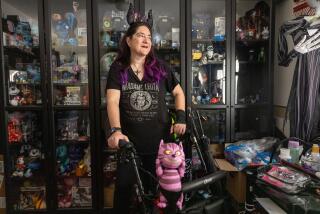For Many Travel Agents, Specialties Are Way to Go : Disabled Take Aim at Bias of Some Travel Agents
- Share via
Staircases, narrow doorways and poorly designed aircraft are sometimes barriers for travelers with physical disabilities. But Louis Nau, who has used a wheelchair since 1942, says he is trying to eliminate what he considers a bigger obstacle--the attitudes of some travel agents.
“Laws require accessibility, but there is no law that regulates attitudes,” Nau said. “Many agents do not want to get involved with disabled people. . . . They’re really losing a lot of business because they don’t seek their business.”
“We’re talking about one of the fastest-growing market segments,” Nau said. “There are 37 million disabled people in the U.S. . . . The number has increased by about 2 million over the past four years.”
Not only could agents boost their own commissions, but they could also bolster the campaign for making planes, ships and some hotels and airports more accessible, Nau contends.
With that in mind, three years ago Nau founded the Travel Industry & Disabled Exchange, a Tarzana-based organization. The group has two major functions, he said. Members exchange information about travel accommodations for the disabled, and they work together to get travel barriers eliminated.
About 350 of the organization’s 500 members are agents, he said, and half of those agents are based in California.
Joyce Johnson, co-owner of Anchor Travel in Pacific Beach near San Diego, said agents need to be more forthcoming. Johnson’s firm is a full-service agency that also specializes in bookings and preparations for disabled travelers. For example, she scouts hotels to ensure that they have ramps or Braille markings on elevator buttons. She gets airlines to provide medical equipment or extra space available on her clients’ flights and--when necessary--arranges escorts.
“A lot of agents are embarrassed or uncomfortable around disabled people,” she said. “They should keep in mind that most of us are disabled in some way. If you wear glasses or have false teeth, you have a disability. It’s just that some disabilities are more apparent than others.”
“People come great distances to see me,” she said. “It would be so much better if they could see travel agents in their own neighborhood. But they come to me--and I can always use the business.”
More to Read
Sign up for The Wild
We’ll help you find the best places to hike, bike and run, as well as the perfect silent spots for meditation and yoga.
You may occasionally receive promotional content from the Los Angeles Times.






